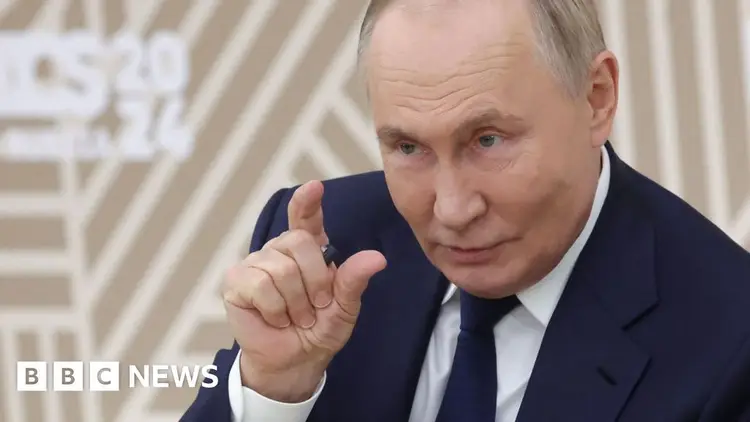Vladimir Putin hosts Brics summit to show West pressure not working

Picture yourself as Vladimir Putin.
The West has labeled you as an outcast for your invasion of Ukraine. Efforts are underway to isolate your nation's economy from international markets through sanctions.
There is a warrant for your arrest issued by the International Criminal Court.
How can you demonstrate that the pressure isn't effective? Consider organizing a summit.
This week, in the city of Kazan, President Putin will welcome over 20 world leaders at the BRICS summit, which focuses on developing economies. Among those attending are China's Xi Jinping, India's Prime Minister Narendra Modi, and Iran's President Masoud Pezeshkian.
The Kremlin has referred to it as one of the most significant foreign policy events in Russia's history.
According to Chris Weafer, co-founder of the consulting company Macro-Advisory, it’s evident that efforts to cut Russia off from the rest of the world have not been successful.
A key message coming from the Kremlin is that Russia is managing to cope with the sanctions imposed on it. However, it’s clear that there are serious issues lurking beneath the surface. On the international stage, Russia claims to have numerous allies, and they all intend to collaborate with the country.
So, who are Russia's allies?
BRICS is an acronym for Brazil, Russia, India, China, and South Africa. Originally seen as a counterbalance to Western dominance, this group has recently grown to incorporate Egypt, Ethiopia, Iran, and the United Arab Emirates.
Saudi Arabia has also received an invitation to participate.
The BRICS countries make up 45% of the world's population. When you combine the economies of these nations, their total value exceeds $28.5 trillion (£22 trillion). This represents about 28% of the entire global economy.
Russian representatives have suggested that 30 additional countries are looking to either become part of Brics or strengthen their connections with the group. Several of these nations are scheduled to attend the upcoming summit. There will likely be extensive discussions in Kazan this week about Brics symbolizing the "global majority."
Beyond giving Vladimir Putin a chance to shine on the global stage, what else is this event expected to accomplish?
Eager to alleviate the strain from Western sanctions, the leader of the Kremlin aims to persuade Brics nations to consider a different currency for international transactions instead of the dollar.
"Many of the challenges facing Russia's economy are related to international trade and financial transactions. A significant portion of this is connected to the US dollar," explains Mr. Weafer.
The US Treasury holds significant authority and impact on international trade, largely due to the fact that the US dollar is the primary currency used for transactions. Russia's key objective is to challenge the supremacy of the US dollar. It aims to encourage BRICS nations to develop a different system for trade and cross-border payments that doesn't rely on the dollar, the euro, or any currencies from the G7. This would lessen the impact of sanctions.
However, detractors highlight the disparities among BRICS nations. "Similar in thinking" isn't a term that accurately captures the current group dynamics.
Jim O'Neill, the former Chief Economist at Goldman Sachs, points out that it's actually beneficial for Western countries that China and India are often at odds. If these two nations were to genuinely find common ground, the BRICS coalition would wield significant power.
China and India often strive to steer clear of conflict, but getting them to genuinely collaborate on economic matters remains an ongoing struggle.
At the beginning of the century, it was Mr. O’Neill who came up with the term "Bric" to refer to four developing economies that he thought needed to be included in key global policy discussions.
However, these four letters began to evolve independently once the respective countries established their own Bric alliance, which later became Brics with the addition of South Africa. This group aimed to compete with the influence of the G7, comprised of the seven largest "advanced" economies: Canada, France, Germany, Italy, Japan, the UK, and the US.
India and China aren't the only countries with their own issues. There's also conflict between Egypt and Ethiopia, which are among the newest members of BRICS. Additionally, while there have been discussions about easing tensions, Iran and Saudi Arabia have historically been rivals in the region.
Mr. O'Neill thinks it's quite absurd to believe that they will all come to a meaningful consensus on an important issue.
While Russia, motivated by anti-Western feelings, discusses the establishment of a "new world order," other BRICS countries, such as India, are eager to maintain strong political and economic ties with Western nations.
In Kazan, Vladimir Putin's objective will be to gloss over any divisions and create an image of solidarity. He aims to demonstrate to both the Russian people and the global audience that his nation is not isolated at all.









































